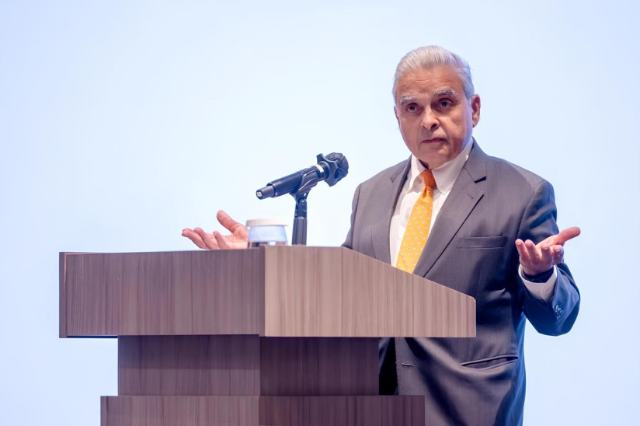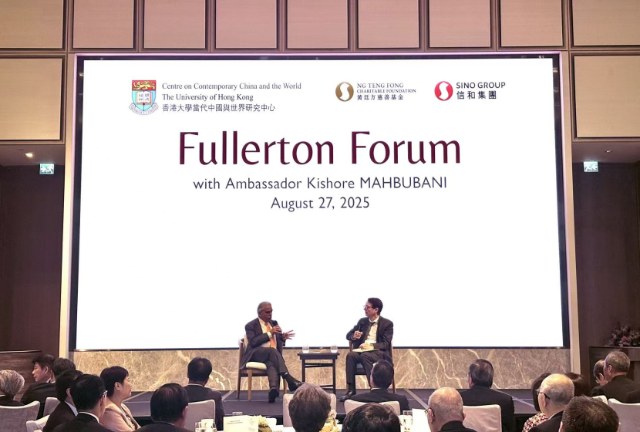"A lot of us, and certainly we in East Asia, have prospered as a result of a world order that the West gifted to us in 1945. That world order has served us very well. But the reality is that this world order is now under threat."

Kishore Mahbubani delivers a luncheon lecture in Hong Kong SAR on August 27, 2025. (Photo: CCCW)
This observation was made by Kishore Mahbubani, a seasoned diplomat with 33 years of experience as Singapore's Ambassador to the United Nations and Founding Dean of the Lee Kuan Yew School of Public Policy at the National University of Singapore.
He made the claim at a luncheon lecture co-organized by the Centre on Contemporary China and the World (CCCW) at the University of Hong Kong on August 27, titled “A Declining West, a Rising East: How Will the World Achieve a New Balance?”.
Statistics illustrate the shift of power from the West to the East
Using statistics from three groups, Mahbubani detailed comparisons between China and the European Union, India and the United Kingdom, as well as ASEAN and Germany in the past, present, and future.
Forty-five years ago, the combined economy of the EU was ten times larger than that of China. The EU and China are about the same size at present. By 2050, the EU will be half the size of China.
In 1990, the British GDP was four times larger than that of India. Last year, India surpassed the UK to become the larger economy. By 2050, India will be four times the size of the UK.
Germany, the industrial powerhouse of Europe, was three times bigger than ASEAN in 2000. By last year, Germany and ASEAN were about the same size. By 2050, Germany will be half the size of ASEAN.
He illustrated to the audience how fundamentally the world has changed amid the shift of power from the West to the East.
Europe's resistance in the IMF & UN is an issue of adapting to a new world
Given these structural changes, Mahbubani bluntly stated that Europe's resistance to change in international organizations such as the International Monetary Fund (IMF) and the UN Security Council has become "in some ways the biggest problem in terms of adapting to a new world."
The world's most powerful international economic organization theoretically claims that "Voting power and decision-making at the IMF reflect its member countries' relative economic positions."
In Kishore's view, it's clear that the IMF honestly admits that its voting structure must reflect the new economic balance of power in the world. The EU and China currently share about the same global Gross National Product. However, the European share of the IMF voting structure is 26%, while China's share is 6%.
Additionally, this former President of the UN Security Council stated that the UK and France resist change in the face of their shrinking economies within the most powerful international political organization.
"Now what's interesting about the composition of these five permanent members is that they are supposed to represent the great powers of the day," he added.
A global village should represent the majority of world's population
Against the status quo, Kishore Mahbubani argued that the 8 billion people in a "global village," as former UN Secretary-General Kofi Annan once depicted, ought to represent the majority of the world's population.
"We live in a small, interdependent, shrinking world ... only 12% live in the West, while 88% live elsewhere."
He expressed that if the global village council ultimately does not represent the majority of the world's population, it will become irrelevant.

Kishore Mahbubani (L) and Daniel Bell (R) have dialogues during the luncheon in Hong Kong SAR on August 27, 2025. (Photo: Zhang Ruijun)
Additionally, hailed as a muse of the Asian century, Mahbubani relentlessly advocates for collaboration between China, India, ASEAN, and other Asian countries in the domains of global governance, multilateralism, and climate response.
He told the South reporter that over 4.1 million downloads of his book "The Asian 21st Century" in 160 countries indicate that "the world is psychologically preparing for an Asian century."
However, Mahbubani emphasized that there is a prerequisite for the Asian century—peace on the Asian continent. "It's quite amazing that we in Asia haven't had a major war. We've had skirmishes, but no major war. This is a stunning feature of Asia that no one has acknowledged."
He noted that despite potential competition, tensions, and rivalry, Asian countries manage to avoid a major war. Mahbubani does not worry too much about the regional economy, as he believes its economic development momentum is real and will continue.
Reporter: Zhang Ruijun
Editor: Yuan Zixiang, James Campion, Shen He
















